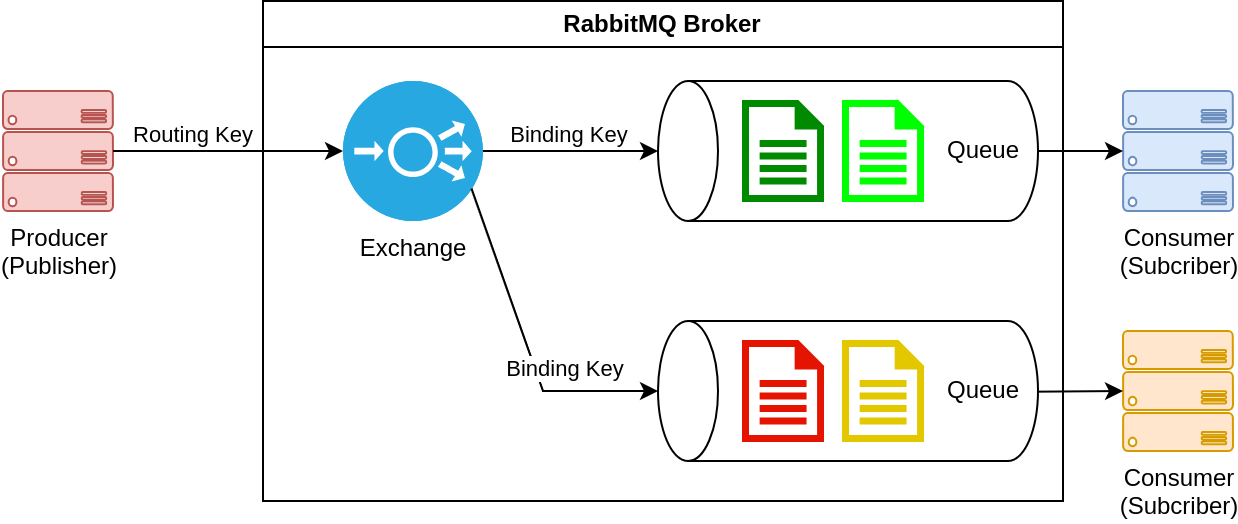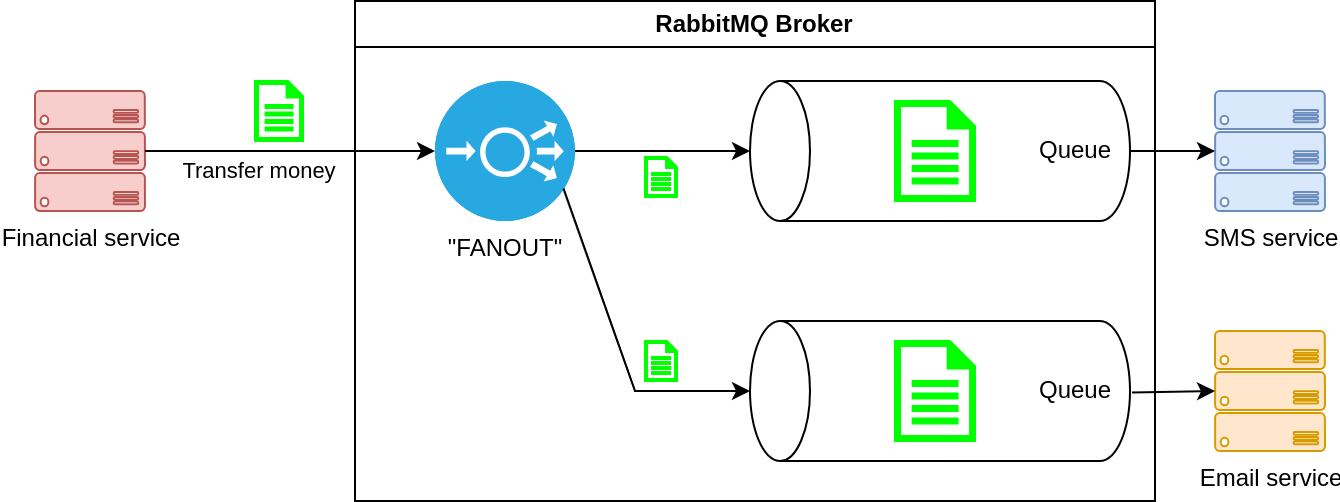RabbitMQ #

- Producer sends and monitors if the message reaches the intended consumer
- Messages are deleted once consumed
- Designed for complex message routing
- Support message priorities
Exchange types #
- Direct Exchange
- Topic Exchange
- Fanout Exchange
- Headers Exchange
- Dead Letter Exchange
Direct Exchange #
- A message goes to the queue(s) with the binding key that exactly matches the routing key of the message

Topic Exchange #
- Route messages to queues based on wildcard matches between the routing key and the binding pattern

Fanout Exchange #
- Copy and route a message to all queues

Headers Exchange #
- Similar to topic exchanges
- Route messages based on header values instead of routing keys
Dead Letter Exchange #
- Capture messages that are not deliverable
Demo #

Setup RabbitMQ Broker #
- Pull the official RabbitMQ image:
sudo docker pull rabbitmq:4.0.5-management - Start a RabbitMQ:
sudo docker run --name rabbitmq -p 5672:5672 -p 15672:15672 rabbitmq:4.0.5-management--nameassigns a name to the container-pmaps the ports from the container to your host machine5672is for RabbitMQ server15672is for management UI
- Access the RabbitMQ Management Console:
- Open a web browser and navigate to http://localhost:15672/
- Log in with the default username
guestand passwordguest
Setup services #
AMQPis the data transfer protocol for communication with RabbitMQ
Prepare
// config.js
module.exports = {
rabbitMQ: {
url: "amqp://localhost",
exchangeName: "logExchange",
exchangeType: "direct",
},
};
You can run this code block bellow with REST Client VScode extension
### post.http
@url=http://localhost:3000
### Info log
POST {{url}}/sendLog
Content-Type: application/json
{
"logType": "Info",
"message": "Everything works OK"
}
### Warning log
POST {{url}}/sendLog
Content-Type: application/json
{
"logType": "Warning",
"message": "Chrome is moving towards a new experience that allows users to choose to browse without third-party cookies"
}
### Error log
POST {{url}}/sendLog
Content-Type: application/json
{
"logType": "Error",
"message": "Unchecked runtime.lastError: The message port closed before a response was received"
}
Logger service
// loggerService.js
const amqp = require("amqplib");
const config = require("./config");
class Producer {
channel;
async createChannel() {
const rabbitmqUrl = config.rabbitMQ.url;
const connection = await amqp.connect(rabbitmqUrl);
this.channel = await connection.createChannel();
}
async publishMessage(routingKey, message) {
if (!this.channel) {
await this.createChannel();
}
const exchangeName = config.rabbitMQ.exchangeName;
const exchangeType = config.rabbitMQ.exchangeType;
await this.channel.assertExchange(exchangeName, exchangeType);
const logDetails = {
logType: routingKey,
message: message,
dateTime: new Date(),
};
await this.channel.publish(
exchangeName,
routingKey,
Buffer.from(JSON.stringify(logDetails))
);
console.log(
`The new ${routingKey} log is sent to exchange ${exchangeName}`
);
}
}
const express = require("express");
const app = express();
const producer = new Producer();
app.use(express.json());
app.post("/sendLog", async (req, res) => {
await producer.publishMessage(req.body.logType, req.body.message);
res.send();
});
app.listen(3000, () => {
console.log("Server started...");
});
Info service
// loggerService.js
const amqp = require("amqplib");
const config = require("./config");
async function consumeMessages() {
const rabbitmqUrl = config.rabbitMQ.url;
const connection = await amqp.connect(rabbitmqUrl);
const channel = await connection.createChannel();
const exchangeName = config.rabbitMQ.exchangeName;
const exchangeType = config.rabbitMQ.exchangeType;
await channel.assertExchange(exchangeName, exchangeType);
const q = await channel.assertQueue("InfoQueue");
await channel.bindQueue(q.queue, exchangeName, "Info");
channel.consume(q.queue, (msg) => {
const data = JSON.parse(msg.content);
console.log(data);
channel.ack(msg);
});
}
consumeMessages();
Warning service
// warningService.js
const amqp = require("amqplib");
const config = require("./config");
async function consumeMessages() {
const connection = await amqp.connect(config.rabbitMQ.url);
const channel = await connection.createChannel();
const exchangeName = config.rabbitMQ.exchangeName;
const exchangeType = config.rabbitMQ.exchangeType;
await channel.assertExchange(exchangeName, exchangeType);
const q = await channel.assertQueue("WarningQueue");
await channel.bindQueue(q.queue, exchangeName, "Warning");
await channel.bindQueue(q.queue, exchangeName, "Error");
channel.consume(q.queue, (msg) => {
const data = JSON.parse(msg.content);
console.log(data);
channel.ack(msg);
});
}
consumeMessages();
- Create a folder to hold all services in one place, such as
RabbitMQ_Demo - Initialize Node.js with:
npm init -y - Install necessary libraries:
amqplib:npm i amqplibexpress:npm i express
- Prepare the necessary files:
config.js,post.http,loggerService.js,infoService.js, andwarningService.js - Start the services:
- Logger service:
node loggerService.js - Info service:
node infoService.js - Warning service:
node warningService.js
- Logger service:
Scenario #
- Send info, warning, or error messages to the Logger service
- Expect: They are routed to the corresponding consumer services
- Try sending some messages with a logType that does not exist in any services
- Expect: The logger service announces that the message was sent to the Exchange, but none of the consumer services receive the message
- Try commenting out the code line in the Consumer service’s code block:
channel.ack(msg);- Expect: Consumer services receive messages normally, but when we start them again, they will receive all unacknowledged messages again
Reference #
- Cloudamqp: Part 4: RabbitMQ Exchanges, routing keys and bindings (Sep 24th, 2019)
- Youtube: RabbitMQ basics (Including different exchange types + real use cases) (Jun 2nd, 2022)
- Svix: Running RabbitMQ in Docker: A Comprehensive Guide
- Youtube: NodeJs Microservices using RabbitMQ (Message Queueing) (Jul 11th, 2022)
Help improve my blog
Was this page helpful to you?
This page was last modified at 2025-02-11